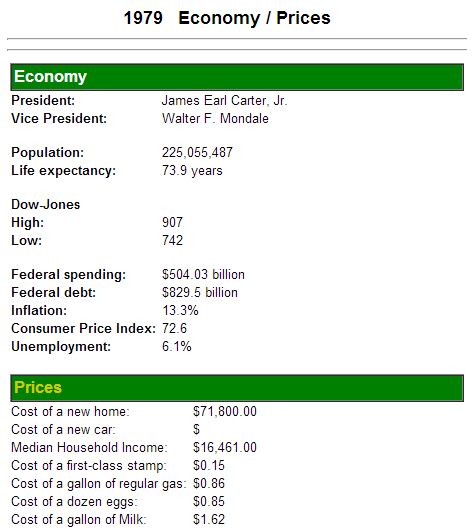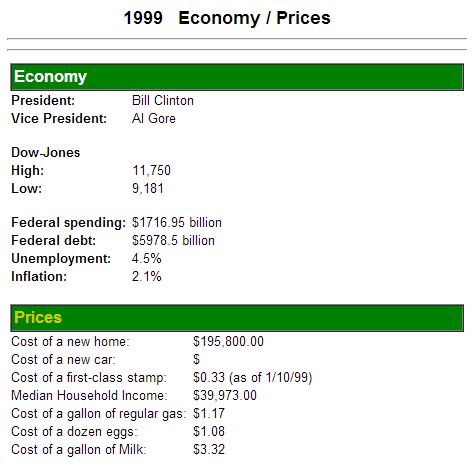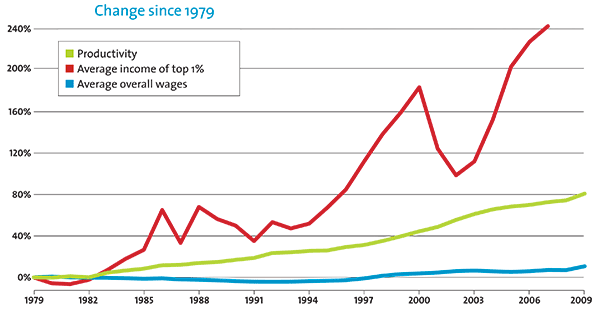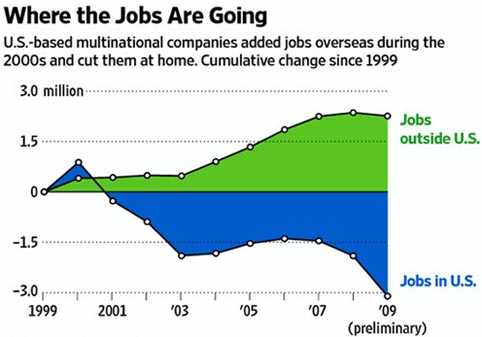It looks like you're using an Ad Blocker.
Please white-list or disable AboveTopSecret.com in your ad-blocking tool.
Thank you.
Some features of ATS will be disabled while you continue to use an ad-blocker.
Citizens Receiving Food Aid from Federal Gov't Now Outnumber Full-Time Private Sector Workers
page: 1share:
This should tell people how much President Obama, and his administration have been lying about the "recovery of jobs in the U.S".
www.breitbart.com...
The economic recovery, and by "recovery" President Obama and his administration actually meant "crash", is en route and all set and ready...
Just wait until people start realizing that there is no money to pay for their food stamps...
How in the heck did we allow this to happen?
This plus the mess that is the "Obamacare"...
The U.S. administration seems to be working overtime to accelerate, and exacerbate the economic crash of the U.S...
...
The U.S. Department of Agriculture estimates that a total of 101,000,000 people currently participate in at least one of the 15 food programs offered by the agency, at a cost of $114 billion in fiscal year 2012.
That means the number of Americans receiving food assistance has surpassed the number of full-time private sector workers in the U.S.
According to the Bureau of Labor Statistics (BLS), there were 97,180,000 full-time private sector workers in 2012.
The population of the U.S. is 316.2 million people, meaning nearly a third of Americans receive food aid from the government.
Of the 101 million receiving food benefits, a record 47 million Americans participated in the Supplemental Nutrition Assistance Program (SNAP), commonly known as food stamps. The USDA describes SNAP as the “largest program in the domestic hunger safety net.”
...
www.breitbart.com...
The economic recovery, and by "recovery" President Obama and his administration actually meant "crash", is en route and all set and ready...
Just wait until people start realizing that there is no money to pay for their food stamps...
How in the heck did we allow this to happen?
This plus the mess that is the "Obamacare"...
The U.S. administration seems to be working overtime to accelerate, and exacerbate the economic crash of the U.S...
edit on 9-7-2013 by ElectricUniverse because: (no reason given)
BTW, my point is that we, and the Obama administration, should be working on providing "work", and not on making sure that more and more Americans
depend on the government to feed their families which will sooner or later mean the crash of the economy of the U.S., and will mean even MORE
Americans will eventually go hungry.
reply to post by ElectricUniverse
It is amazing how much worse we are under Obama in just 5 years.
I don't think he could have done more damage to the country and our prosperity if he was doing it on purpose.
Wait..
It is amazing how much worse we are under Obama in just 5 years.
I don't think he could have done more damage to the country and our prosperity if he was doing it on purpose.
Wait..
When the people find they can vote themselves money, that will herald the end of the republic.
~Benjamin Franklin
Well logic alone says that this is completely unsustainable, but nothing will be done about it. Brings new meaning to the phrase "keep working, millions on welfare depend on you".
~Benjamin Franklin
Well logic alone says that this is completely unsustainable, but nothing will be done about it. Brings new meaning to the phrase "keep working, millions on welfare depend on you".
edit on 7/9/2013 by SpaDe_ because: (no reason given)
Yes they should be working on improving the economy and providing jobs, if that's what they're intersted in, but it seems they truly do have a
different agenda and it's playing out quite well. The Cloward Priven strategy?
www.discoverthenetworks.org...
www.discoverthenetworks.org...
edit on 9-7-2013 by Maluhia because: (no reason
given)
reply to post by ElectricUniverse
That is a misnomer, as many of those people who are receiving food stamps are actually employed full time. They just are at menial minimum wage jobs and their paycheck doesn't even come close to the cost of living in the US. And employers are all too happy to just replace anyone that asks for a raise with one of the stacks of applicants they receive everyday.
Course bretbart (the king of misleading information) isn't going to say that.
That is a misnomer, as many of those people who are receiving food stamps are actually employed full time. They just are at menial minimum wage jobs and their paycheck doesn't even come close to the cost of living in the US. And employers are all too happy to just replace anyone that asks for a raise with one of the stacks of applicants they receive everyday.
Course bretbart (the king of misleading information) isn't going to say that.
Originally posted by HauntWok
reply to post by ElectricUniverse
That is a misnomer, as many of those people who are receiving food stamps are actually employed full time. They just are at menial minimum wage jobs and their paycheck doesn't even come close to the cost of living in the US. And employers are all too happy to just replace anyone that asks for a raise with one of the stacks of applicants they receive everyday.
Course bretbart (the king of misleading information) isn't going to say that.
Interesting spin.
So it is the fault of business for not paying people more; that there are so many on food stamps.
Your response would be for the government to step in and raise minimum wage?
edit on 10-7-2013 by beezzer because: (no reason given)
reply to post by beezzer
My response would be that maybe employers should take a page from Henry Ford and pay employees a living wage. It would help the economy and promote business.
Your response would be for the government to step in and raise minimum wage?
My response would be that maybe employers should take a page from Henry Ford and pay employees a living wage. It would help the economy and promote business.
Originally posted by HauntWok
reply to post by beezzer
Your response would be for the government to step in and raise minimum wage?
My response would be that maybe employers should take a page from Henry Ford and pay employees a living wage. It would help the economy and promote business.
But that would increase prices, raise unemployment,. . . . that old song and dance.
Now one thing government COULD do is impose a tax holliday for two years.
(Since deficits don't matter)
Give businesses more capital to pay their employees, expand their business, hire more people. . . .
Naaaaa. That would only decrease the dependence of people relying on government.
reply to post by beezzer
How about not relying on the government for the solution and instead rely on the private sector for the solution?
It's hard to feel sorry for businesses when their profits are at all time highs and the stock market is breaking records.
Maybe, we could offer tax incentives to businesses who don't have any full time employees on food stamps because they are paying them a living wage.
How about not relying on the government for the solution and instead rely on the private sector for the solution?
It's hard to feel sorry for businesses when their profits are at all time highs and the stock market is breaking records.
Maybe, we could offer tax incentives to businesses who don't have any full time employees on food stamps because they are paying them a living wage.
Originally posted by HauntWok
reply to post by beezzer
How about not relying on the government for the solution and instead rely on the private sector for the solution?
Yet government imposes harsh penalties just for being successful, how are we to ignore that?
It's hard to feel sorry for businesses when their profits are at all time highs and the stock market is breaking records.
Some corporations are, sure. But most people are hired by small businesses that don't figure into your profit category. Also, the stock market is only as high as it it due to FED (and/or government) intervention.
Maybe, we could offer tax incentives to businesses who don't have any full time employees on food stamps because they are paying them a living wage.
I'm always up for anything that doesn't include higher taxes.
reply to post by beezzer
We ignore that by realizing that the government doesn't impose harsh penalties for being successful, reality goes a long way to helping a problem that doesn't exist.
Oh yes, the whinny cry of the plight of the small business. Shed me some more of those crocodile tears. When I wash those "small business owners" 2013 Lexus, or Jaguar, or Porsche, or Maserati. I feel the pain they are going through.
And here you are admitting thanks to government intervention that wall street has become successful again.
Yet government imposes harsh penalties just for being successful, how are we to ignore that?
We ignore that by realizing that the government doesn't impose harsh penalties for being successful, reality goes a long way to helping a problem that doesn't exist.
Some corporations are, sure. But most people are hired by small businesses that don't figure into your profit category. Also, the stock market is only as high as it it due to FED (and/or government) intervention.
Oh yes, the whinny cry of the plight of the small business. Shed me some more of those crocodile tears. When I wash those "small business owners" 2013 Lexus, or Jaguar, or Porsche, or Maserati. I feel the pain they are going through.
And here you are admitting thanks to government intervention that wall street has become successful again.
Originally posted by beezzer
But that would increase prices, raise unemployment,. . . . that old song and dance.
What?
What do you base that on?
Lets look at some facts here,
We will start in 1979, concentrating on the prices of goods.

To 1999,

Now today
2013
Gallon of Gas - $3.56
Dozen eggs - $2.50
Gallon of Milk - $3.44
First Class Stamp - $0.46
Now lets take a look at wages from 1979

It is obvious that over the past 3 decades wages have stagnated yet the cost of living and the average income of the top 5% and company profits continue to climb.
Another obvious point here is climbing wages would not increase prices, raise unemployment etc, they have done that WITH Stagnated wages.
The minimum wage would be at $22 An Hour if it had kept up with productivity, sure the top 5% would make less money and the wage inequality gap would shrink back to the levels it was decades ago.
This is why the middle class is shrinking and the economy is struggling.
You want an economic stimulus program that will work? Pay people a fair wage watch the middle class grow, the economy get strong and people get off welfare. Or be a greedy business owner and contribute to the slow death of this country.
Follow the Costco example.
Originally posted by Metallicus
reply to post by ElectricUniverse
It is amazing how much worse we are under Obama in just 5 years.
I don't think he could have done more damage to the country and our prosperity if he was doing it on purpose.
Wait..
hahahahahaha....yeah right, Obama is the problem....
www.guardian.co.uk...
Originally posted by beezzer
Some corporations are, sure. But most people are hired by small businesses that don't figure into your profit category..
USA is the country, who has by far the smallest small-business sector out of the other advanced countries and has most people working for corporations. 7,2% self-employed and 11,1% small enterprises compared to a whopping 52,7% working for corporations.
Take a look at that study:
www.cepr.net...
-The United States has the second lowest share of self-employed workers (7.2 percent).
-The United States has among the lowest shares of employment in small businesses in manufacturing - only 11.1 percent of the U.S. manufacturing workforce is in enterprises with fewer than 20 employees. Eighteen other rich countries have a higher share of manufacturing employment in small enterprises, including Germany (13.0 percent), Sweden (14.4 percent), and France (18.0 percent).
-U.S. small businesses are particularly weak in high-tech. The United States, for example, has the second lowest share of computer-related service employment in firms with fewer than 100 employees and the third lowest share of research and development related employment in firms with fewer than 100 employees.
Despite our national self-image as a nation of small businesses and entrepreneurs, the United States
small-business sector is proportionately not as large an employer as the small-business sectors in the
rest of the world’s rich economies. One interpretation of these data is that self-employment and
small-business employment may be a less important indicator of entrepreneurship than we have long
thought. Another reading of the data, however, is that the United States has something to learn from
the experience of other advanced economies, which appear to have had much better luck promoting
and sustaining small-business employment.
rwer.wordpress.com...
In US of course the whole consumerist attitude also plays significant part. The prices are very low compared to the rest of the world, while the salaries are relatively high, yet people find themselves in financial trouble all the time, so in a way it can also be taken as a low financial intelligence, although I would still imply that corporations hold a lot of responsibility over it.
Corporations are effective business model, when taking shareholders into account, although it is not that good considering the employees, as there are just too many. The profits might seem to go into billions, yet these billions are spent fast even with smaller raises. If Walmart ( I do not know the exact salary there, although I have heard they do not pay very well) raised salaries of all employees (except 200k of the highest paid) by 10k a year, this would mean them losing billions every year. Same would apply if they rose their prices, as this is their major competitive advantage right now among similar chains. Most consumers go for the companies with the best prices.
I do not get why people see others on welfare as people leeching off the government. I have seen posts showing despise towards such actions, implying that the posters would never use such options, rather live in street than leech off the government.
It does not make sense, as at the end everyone also paying for it themselves. I do not know exactly how US taxes are distributed in their budget, although it is consisted of the taxes paid individually. Most people on welfare have worked in their life before/or their parents have or they will soon. So they are/have paid certain part if not all for it at the end.
If I would be unemployed I would be more than happy to take it, as every month me, my parents have worked, they have paid a very small % (around 1% or less) to the government unemployment insurance - about a year receiving 50% of your previous salary + innumerous free-of-charge extra trainings.
I personally prefer such collective non-profit government provided "insurance", everybody puts something in. When any person needs help, they are helped out. It has less regulations and also noone is left out when in need a´la insurance does not cover it or some similar BS. I would rather have certain people receive the welfare than go towards crime in need of money, as the salary they get is too small or they lost their job due to bad decisions at the top..
I have nothing against higher taxes, if I get enough back from them. The strong social safety network, universal healthcare, strong public education, free higher education, 3-years paid parent leave are worth the taxes in my opinion. If these were privatised, I would pay times more at the end , poorer kids would have significant disadvantage during their lives and much more people would turn to crime to survive.
Originally posted by beezzer
Originally posted by HauntWok
reply to post by beezzer
Your response would be for the government to step in and raise minimum wage?
My response would be that maybe employers should take a page from Henry Ford and pay employees a living wage. It would help the economy and promote business.
But that would increase prices, raise unemployment,. . . . that old song and dance.
Now one thing government COULD do is impose a tax holliday for two years.
(Since deficits don't matter)
Give businesses more capital to pay their employees, expand their business, hire more people. . . .
Naaaaa. That would only decrease the dependence of people relying on government.
more capital??????...lol......
www.cnbc.com...
After 5 years of Obama and yet there are those who still say we aren't being taxed enough.
5 years of higher taxes, 5 years of high unemployment, 5 years of economic malaise, so basically you all are saying, "If you're in a hole, DIG DEEPER!"
We need to stop punishing success. We need to stop penalising business. We need to eliminate the regulations and new laws and taxes that impede business development.
Or we can "dig deeper".
I see many have their "shovels ready".
5 years of higher taxes, 5 years of high unemployment, 5 years of economic malaise, so basically you all are saying, "If you're in a hole, DIG DEEPER!"
We need to stop punishing success. We need to stop penalising business. We need to eliminate the regulations and new laws and taxes that impede business development.
Or we can "dig deeper".
I see many have their "shovels ready".
reply to post by beezzer
This administration has actually lowered taxes, & kept the Bush era tax cuts.
www.factcheck.org...
I have no idea where you keep getting that Obama has raised taxes
As for the unemployment problem, why not take a look at Republicans who have purposely stalled and delayed any recovery efforts by the left in order to make sure this president fails.
www.cnn.com...
www.policymic.com...
This administration has actually lowered taxes, & kept the Bush era tax cuts.
www.factcheck.org...
I have no idea where you keep getting that Obama has raised taxes
As for the unemployment problem, why not take a look at Republicans who have purposely stalled and delayed any recovery efforts by the left in order to make sure this president fails.
www.cnn.com...
www.policymic.com...
edit on 10-7-2013 by
HauntWok because: (no reason given)
Originally posted by HauntWok
reply to post by beezzer
This administration has actually lowered taxes, & kept the Bush era tax cuts.
www.factcheck.org...
Really? Wow. I thought those ended for people making over 200K a year. I must have been wrong. My bad.
I have no idea where you keep getting that Obama has raised taxes
As for the unemployment problem, why not take a look at Republicans who have purposely stalled and delayed any recovery efforts by the left in order to make sure this president fails.
www.cnn.com...
www.policymic.com...edit on 10-7-2013 by HauntWok because: (no reason given)
Blame the minority party in the senate, you mean? Recovery efforts? More like increasing size/scope of government, but whatever gets you through the day I suppose.
reply to post by beezzer
The whole party warfare thing is getting old, BOTH major parties contribute to the mess we are in ...
Their goal is to keep us fighting among ourselves, trying to decide who is going to destroy the Country less, while they laugh all the way to the bank and it is working.

Why is unemployment growing?

Personally, I think everything went to hell once we started NAFTA and programs like it. Free trade is a BAD idea. The only people who benefit are the businesses outsourcing work, consumers do not see a drop in prices on the imported products and it has forced wages to stagnate here at home to remain "competitive" i.e. More profit for the companies. This is decimating the middle class which are the ones who pump money back into our economy usually on the local level and are the life blood of the USA.
There is the reason for your economic malaise ...
The whole party warfare thing is getting old, BOTH major parties contribute to the mess we are in ...
The only difference between the Republican and Democratic parties is the velocities with which their knees hit the floor when corporations knock on their door. That's the only difference. ~ Ralph Nader
Their goal is to keep us fighting among ourselves, trying to decide who is going to destroy the Country less, while they laugh all the way to the bank and it is working.

Why is unemployment growing?

Personally, I think everything went to hell once we started NAFTA and programs like it. Free trade is a BAD idea. The only people who benefit are the businesses outsourcing work, consumers do not see a drop in prices on the imported products and it has forced wages to stagnate here at home to remain "competitive" i.e. More profit for the companies. This is decimating the middle class which are the ones who pump money back into our economy usually on the local level and are the life blood of the USA.
There is the reason for your economic malaise ...
new topics
-
George Stephanopoulos and ABC agree to pay $15 million to settle Trump defamation suit
Mainstream News: 8 minutes ago -
More Bad News for Labour and Rachel Reeves Stole Christmas from Working Families
Regional Politics: 6 hours ago -
Light from Space Might Be Travelling Instantaneously
Space Exploration: 7 hours ago -
The MSM has the United Healthcare assassin all wrong.
General Conspiracies: 8 hours ago -
2025 Bingo Card
The Gray Area: 8 hours ago -
The Mystery Drones and Government Lies
Political Conspiracies: 10 hours ago
top topics
-
Pelosi injured in Luxembourg
Other Current Events: 17 hours ago, 21 flags -
The Mystery Drones and Government Lies
Political Conspiracies: 10 hours ago, 13 flags -
Light from Space Might Be Travelling Instantaneously
Space Exploration: 7 hours ago, 8 flags -
2025 Bingo Card
The Gray Area: 8 hours ago, 7 flags -
The MSM has the United Healthcare assassin all wrong.
General Conspiracies: 8 hours ago, 7 flags -
More Bad News for Labour and Rachel Reeves Stole Christmas from Working Families
Regional Politics: 6 hours ago, 7 flags -
George Stephanopoulos and ABC agree to pay $15 million to settle Trump defamation suit
Mainstream News: 8 minutes ago, 1 flags
active topics
-
George Stephanopoulos and ABC agree to pay $15 million to settle Trump defamation suit
Mainstream News • 2 • : xuenchen -
The Mystery Drones and Government Lies
Political Conspiracies • 63 • : Zaphod58 -
Light from Space Might Be Travelling Instantaneously
Space Exploration • 17 • : FullHeathen -
Drones everywhere in New Jersey
Aliens and UFOs • 128 • : angelchemuel -
-@TH3WH17ERABB17- -Q- ---TIME TO SHOW THE WORLD--- -Part- --44--
Dissecting Disinformation • 3681 • : Thoughtful3 -
Something better
Dissecting Disinformation • 25 • : Astrocometus -
Pelosi injured in Luxembourg
Other Current Events • 31 • : xuenchen -
2025 Bingo Card
The Gray Area • 14 • : Oldcarpy2 -
DONALD J. TRUMP - TIME's Most Extraordinary Person of the Year 2024.
Mainstream News • 40 • : WeMustCare -
A priest who sexually assaulted a sleeping man on a train has been jailed for 16 months.
Social Issues and Civil Unrest • 29 • : Oldcarpy2
